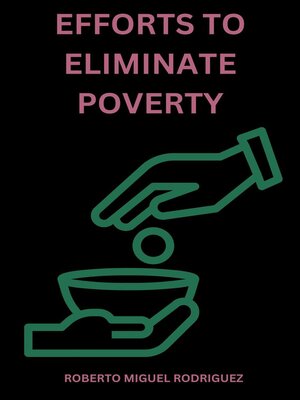
Sign up to save your library
With an OverDrive account, you can save your favorite libraries for at-a-glance information about availability. Find out more about OverDrive accounts.
Find this title in Libby, the library reading app by OverDrive.



Search for a digital library with this title
Title found at these libraries:
| Library Name | Distance |
|---|---|
| Loading... |
Efforts to Eliminate Poverty is a compelling collection of seven essays that analyze the various efforts made by governments around the world to reduce poverty. Each essay takes a deep dive into different approaches and their outcomes, offering a comprehensive view of how poverty is being addressed on both a national and global scale.
The book begins by exploring the social welfare programs of welfare state governments, particularly in Western Europe, where comprehensive systems of unemployment benefits, healthcare, housing assistance, and social services have proven effective in ensuring a basic standard of living for citizens. However, the book also examines the criticisms of these programs, particularly their high cost and the potential disincentives for work.
In the market-oriented approaches adopted by capitalist democracies, the book analyzes how wealth creation through economic growth, deregulation, and job creation has contributed to poverty reduction, but also highlights the rise of income inequality that continues to persist, especially in countries like the United States and the United Kingdom.
Shifting focus, the book delves into communist and socialist governments, where centralized control and wealth redistribution efforts have been used to tackle poverty. The essay provides an honest assessment of countries like Cuba, where universal healthcare and education have significantly improved living standards, but also discusses the inefficiencies and authoritarian governance that sometimes undermine these efforts.
In emerging economies like China, India, and Brazil, the book looks at development-oriented policies that aim to reduce poverty through rapid economic growth and targeted poverty alleviation programs. While some of these nations have made significant strides, challenges such as corruption, income inequality, and political instability continue to impede broader success.
The book also addresses the role of international aid and global cooperation in poverty reduction, with a critical examination of multilateral efforts led by organizations like the United Nations, World Bank, and IMF. It evaluates both the successes and limitations of foreign aid, particularly when it comes to the effectiveness of aid in the face of corruption and local political dynamics.
For authoritarian regimes, the book discusses how top-down poverty reduction policies, often implemented in countries like Myanmar or certain African nations, may promise rapid development but fall short due to governance challenges, corruption, and inadequate social services. The effectiveness of such regimes' policies is analyzed through examples of both success and failure.
Finally, the book highlights local government and grassroots poverty reduction programs, where community-driven solutions often lead to impactful, tailored initiatives. By focusing on local needs through microfinance, education, and other grassroots efforts, these programs demonstrate the potential for sustainable change, although they are sometimes limited by resource constraints and political challenges.
Efforts to Eliminate Poverty provides an insightful exploration of the different strategies employed by governments across the globe in their attempts to address one of the most pressing issues of our time. By examining both successes and failures, the book presents a nuanced understanding of poverty reduction efforts and challenges readers to think critically about the best ways to move forward in the fight against poverty.







